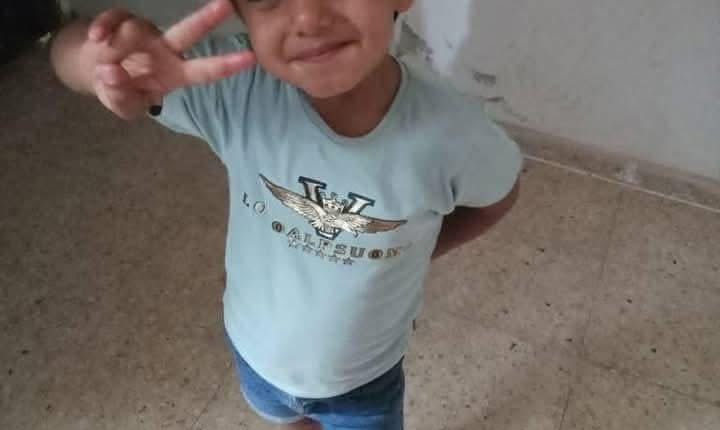SANAA, May 27 (YPA) – The five-year-old boy, Abdul-Rahman Nabil Nabhan, didn’t know that a trip he embarked Wednesday morning would be the last of his short life, he woke up every day to the whispers of hunger in his sisters’ bellies, and to the sighs of a mother who mastered the art of patience as she distributed the remaining dry bread among a number of hungry mouths.
That morning, there was much talk at the Mufti Girls’ School in Gaza’s Beach Camp, which had been converted into a shelter, about a “hospice” that would distribute food to the displaced in the square. The idea seemed grand to a child in this age, but for him and his family, it was a matter of life and death. He thought, “I’ll bring them food… to make them happy.” But the pots was boiling, waiting for him.
Abdul-Rahman, who had never attended school to learn and study, emerged from the classroom where the family had been sleeping for months, barefoot as usual, clutching a small plastic pot, walking through the crowd, jostling with hundreds of others—outstretched hands, pushing bodies, pale faces vying for a meal.
In a painful jostling, he lost his balance. No one noticed the small child lost among the crowd, falling into the large pot of boiling food. A single scream tore through the clamor of hunger. Just one moment was enough to turn his tender body into charred paper.
Some rushed to rescue him, but the flames were faster. One of them carried him as he screamed and writhed, searching for a hand to put out the fire or a voice to reassure him. He was taken to Al-Shifa Hospital, but the burns that had consumed 70% of his body had eaten away at his skin, eyes, and features.
The Bitterness of Helplessness
Abdul-Rahman suffered severe third-degree burns, attempts to save him, despite the scarcity of medicine and the lack of medical care, had proved futile. He breathed his last hours in Al-Shifa Hospital, which fills daily with the bodies of children and the wailing cries of mothers.
In the emergency room, his father, Nabil Nabhan, stood in shock over his son’s body, sweating and tearing. He said nothing, but leaned over his barely visible child’s face and whispered words resembling an apology in his ear—not for any negligence, but for the horror of the world that had let them all down. Then, amid his tears, he muttered a sentence that sums up the pain of the Israeli aggression and the bitterness of helplessness: “Before the war, I never deprived my children of anything.”
Left for a bite to eat
Rahaf, his sister, who was only two years older than him, didn’t understand the meaning of death, but she felt the absence. She whispered in a broken voice as she rested her head on his empty pillow.
“He went to bring us food…He fell into the pot… He was sleeping next to us, and now he’s gone, she spoke sadly.
A simple, childish phrase, yet it tears the heart apart, carrying within its words painful questions: Why are children pushed to die for food? Why is a child who has not yet reached his fifth year forced to bear the burden of survival for his family?
The incident was not exceptional; it is a recurring scene in wounded Gaza, where children face two choices: death under bombardment or by starvation.
Arab Failure and International Silence
In the corner of the school that has been turned into a shelter, the big pot is still boiling. People are still hungry, and children are searching for a meal without queuing. No one is asking about Abdul-Rahman. Death in Gaza has become crowded, even for children.
Across the world, decision-making capitals remain preoccupied with hesitant statements that do nothing to quell the hunger and bloodshed. Aid is rationed and rotting at Arab crossings, positions are timid, and the world is content to watch the images of burning children without batting an eyelid. Statements of condemnation, cold declarations, and neutral reports do not quench the hunger or protect children from falling into the pots.
Finally, Abdul-Rahman was not a soldier, nor a fighter, nor even a student yet. He was a child trying to feed his siblings in a homeland the world had made uninhabitable.
He fell into a boiling pot, his name becoming another mark on the map of Palestinian pain and a new stain on the brow of silent humanity.
Abdul-Rahman died of hunger…burned, trying to be a little hero in his mother’s eyes, but he found nothing but the flames of fate…and the silence of the world.


